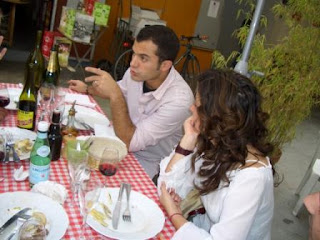"Mentre Israele continua con i suoi raid criminali nella Striscia di Gaza, che solo negli ultimi due giorni hanno ucciso 14 persone ferendone almeno una cinquantina, e Hamas non ha fermato i rockets su Sderot che per fortuna non hanno fatto vittime, un altro scempio di umanità si sta consumando sotto gli occhi di tutti a Rafah" lo ha dichiarato Luisa Morgantini, Vice Presidente del Parlamento Europeo.
"Anziani, ammalati, bambini, donne e uomini–continua la Morgantini- in tutto 4000 palestinesi sono bloccati al valico di Rafah, confine meridionale della striscia di Gaza con l'Egitto, sotto un sole cocente, con una temperatura di 42 gradi, senza soldi, e con cibo e acqua centellinati.
A queste 4000 persone non arriva nessun aiuto umanitario e nessuna assistenza dalle organizzazioni internazionali o nè dal Governo Egiziano. Le condizioni igieniche e logistiche sul posto sono del tutto inadeguate e la situazione è ancora più drammatica se si pensa che tra questi molti sono degli ammalati di ritorno dagli ospedali de Il Cairo che chiedono solo di tornare alle proprie case.
Chi di loro può permetterselo, passa le notti negli alberghi più vicini, pagando dei prezzi altissimi, gli altri sono abbandonati a loro stessi e non possono più neanche comprare le medicine.
Il confine, dopo il ritiro di Israele dalla Striscia nel settembre 2005, era controllato dalle forze dell'Autorità nazionale palestinese, con l'ausilio di una settantina di osservatori europei. Dal giugno 2006, quando e' stato rapito a Gaza il soldato israeliano Ghilad Shalit, Israele ne ha permesso l'apertura solo un quinto del tempo, 74 giorni su 335. Dopo i recenti scontri inter-palestinesi, che hanno portato alla vittoria di Hamas a Gaza, Israele ha deciso di aggravare ulteriormente la crisi, con raid indiscriminati nella Striscia e la chiusura dei valichi sia per le persone che per le merci.
Questa situazione deve finire, ma l'Egitto si dice pronto ad aprire la frontiera, l'unica porta sul mondo per il milione e mezzo di palestinesi che vivono a Gaza, soltanto quando tornerà il gruppo di osservatori europei con l'incarico di sorvegliarla dalla parte palestinese, ignorando come fa Israele e la Comunità Internazionale che ci sono migliaia di persone che da due settimane vivono in condizioni disperate.
Rivolgo questo appello all'Unione Europea e all'intera Comunità Internazionale affinché non rimangano inerti di fronte all'ennesimo strazio inferto alla popolazione palestinese, facendo anzi pressioni sul Governo israeliano perché riapra immediatamente tutti i valichi di confine della Striscia di Gaza, che rinchiudono arbitrariamente e unilateralmente in una gabbia la popolazione civile, costretta a sopravvivere senza cibo, acqua e con servizi sanitari al collasso.
Infine ritengo che far proprio questo appello, da parte del neo-eletto inviato speciale del Quartetto, Tony Blair, sia un segnale estremamente importante, un primo passo per ridare credibilità alla sua figura presso l'opinione pubblica palestinese e araba, scettica sull'imparzialità di uno dei fautori principali della catastrofe irachena e accanito sostenitore dell'aggressiva politica estera statunitense.
La soluzione della tragedia palestinese che non è una questione solo umanitaria è nella fine dell' occupazione militare israeliana, ma intanto si agisca subito sulle condizioni di vita quotidiana".


























